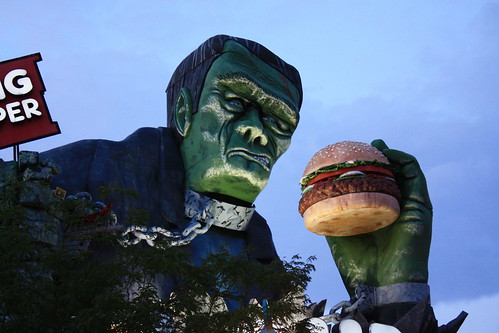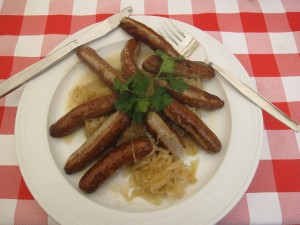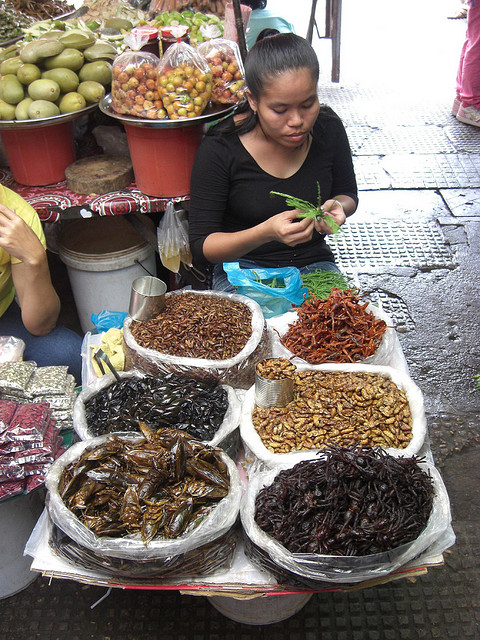Search Results for Tag: meat
‘Hands off my sausage,’ say Germans to meat-free proposal
Rice and beans instead of sausages and meat? The very idea of eathing just vegetarian fare – even if it’s just once a week – has many meat-loving Germans up in arms. Find out why.
The whole kerfuffle began earlier this week with Germany’s opposition Green Party saying they planned to roll out a weekly vegetarian day if elected. Yes, Germany is in full campaign mode with six campaign weeks left until national elections.
So, what’s the fuss about? The Greens say one day each week, workplace cafeterias at federal government institutions would be banned from serving any meat dishes or products. The environmentally-friendly party hopes that would become a model for corporate and school canteens.The party says lower meat consumption would reduce the impact of farming on the environment, lead to an increase in quality and better conditions for animals.
“A veggie day is a wonderful day to try out how to nourish oneself without meat and sausage for once,” Green Party leader Renate Künast told mass-market daily Bild this week.
But, many think otherwise. Though environmental groups have welcomed the proposal, it’s sparked uproar in the country. Some lawmakers have said it smacks of a lecturing attitude. German Agricultural Minister Ilse Aigner was quoted through a spokesman that “we don’t place much stock in paternalism. At the end of the day, we need a balanced diet and meat is part of that.”
Meat certainly is a big part of German‘s lives. Estimates suggest that per capita meat consumption in the country per year is 60 kilograms (against a global average of 42 kg per-capita annually).
A recent United Nations study suggested people in the industrialized world should halve their meat consumption, saying the demand for ever cheaper meat is ruining the planet by leading to a massive expansion of intensively farmed livestock, diverting vast quantities of grain from human to animal consumption and requiring intensive use of fertilisers, pesticides and herbicides.
But many meat-loving Germans remain unconvinced. Members of the youth wing of the Free Democrats (FDP) even organized a spontaneous street barbeque this week in front of Green Party headquarters in Berlin. Some members held up slogans saying “Hands off my sausage.”
Food for thought on World Environment Day

Photo credit: CC BY 2.0: chichacha/flickr.com http://bit.ly/14vPiAs
Today is World Environment Day and this year’s event is focused on cutting the world’s staggering amount of food waste. “Think. Eat. Save. Reduce your Foodprint“ is the motto of the global event which is being marked by marches, awareness-raising campaigns, talks, marathons and other events around the globe.
And the statistics published by the United Nations might just give you food for thought. According to the UN Food and Agricultural Organization (FAO), an estimated one third, or 1.3 billion tons, of all food produced worldwide ends up in the trash. Farmers, transporters, retailers and consumers alike are to blame for the waste.
The FAO says this isn’t just a colossal waste of food but also a squandering of natural resources used along the production and supply chain process. The FAO is urging people to be more aware of the decisions they make regarding food consumption.
And if that isn’t enough to make you pause and think, consider this – the FAO says that to produce one single hamburger, 16,000 liters of water are used.
And here’s another chilling fact for all the meat-lovers out there – the FAO estimates that producing one kilogram of meat is far worse for the environment than a 250-kilometer-long car drive. That takes into account the massive cost of feeding animals. It’s estimated that up to 35 percent of grain harvests around the world and 80 percent of soya harvests are used as animal feed.
At the same time, 870 million people around the world go hungry every day.
Eat (more) insects!
Ever wondered what you could do to fight climate change, but never came up with a proper solution? A quiet common way is to switch to a vegetarian diet, as meat production accounts for about 30 per cent of greenhouse gas emissions. If you can’t do without your daily portion of proteins (aka meat) – here might be a convenient idea: Eat more insects! This is not a suggestion of some weird person being anxious about animals with too many legs and wants them to go extinct. It’s a seriously meant proposal from the UN to feed the booming population all over the world.
If a simple recommendation is not good enough for you, but you need some convincing numbers- the New Scientist has put them down:
To produce 1 kilogram of beef, for example, you need 10 kg of feed, whereas 1 kg of crickets requires just 1.7 kg. What’s more, 80 per cent of a cricket is edible compared with just 40 per cent of a cow.
In consequence, much less land would be needed to grow food for our food (as insects could even grow on kinds of waste) – we would get more food from the same amount of grain and would thereby cut pollution.
This kind of diet is already familiar in some parts of the world, yet the most consumed are beetles, ants and bees. In total 1,900 insects have been identified to be suitable for human diet.
But for lots of people it is quite unthinkable to take a bite. What’s your opinion: Is the argument of sustainability strong enough to change people’s minds?
Jane Goodall: 300 days on the road for the cause
Meeting Jane Goodall, British primatologist and avid environmental activist, is an honour. Global Ideas took the opportunity to talk with the world’s foremost expert on chimpanzees during a film screening in Brussels. The documentary Love MEATender focuses on earth’s growing hunger for more meat and the price we already have to pay for the excessive consumption.
A lot of people are already aware of the situation we are in, Goodall says. But that does not automaticly change something:
GI Jane Goodall What has to be done from DW_Global Ideas on Vimeo.
One of today’s main problems is that earth’s population is growing fast and with it the number of people who want to consume meat, Goodall adds. As the middle classes in the developing world are rising up, they want to have the same standards of living as the industrialized countries have. “Which is of course understandable.” But the planet is not growing, so it won’t be able to support this lifestyle much longer.
GI Jane Goodall more meat more problem from DW_Global Ideas on Vimeo.
For Jan Goodall the newest generations are the key to a solution. Her organization, the Jane Goodall Institute, runs an initiative called “Roots and Shoots program,” with the goal to “provide young people with the knowledge, tools and inspiration to improve the environment and the quality of life for people and animals,” as the program’s website says. “We need to train a new generation to be better stewards than we have been,” she adds. Otherwise there would be absolutly no point:
GI Jane Goodall important young people from DW_Global Ideas on Vimeo.
Frankenstein meat to curb climate change?
 Between the emission of methane (which traps more heat than CO2), deforestation for animal feed production, loss of biodiversity due to eutrophication, acidification, pesticides and herbicides as well as land degradation, 'factory farming' (the method through which most of the world's meat is produced) is considered more an earth pollutant than vehicles.
Between the emission of methane (which traps more heat than CO2), deforestation for animal feed production, loss of biodiversity due to eutrophication, acidification, pesticides and herbicides as well as land degradation, 'factory farming' (the method through which most of the world's meat is produced) is considered more an earth pollutant than vehicles.
Scientists at the Medical University of South Carolina are now hoping these environmental concerns will lead to more funding for what they consider the food of the future: lab grown meat. The scientists have taken embryonic cells that develop into muscle tissue from turkey and bathed them in a nutrient bath of bovine serum on a scaffold made of chitosam to grow animal skeletal muscle tissue. In order to make the meat juicy, they are adding a vascular system so that interior cells can receive oxygen. The scientists say this will take the need for feed out of the equation as well as stop the clearing of land for the factory farms.
The scientist in charge of the product plans on calling the resulting food 'charlem' for Charleston engineeered meat. It's a thought that almost makes you want to become vegetarian.
(jhoff)
(Photo by ogondio)







Feedback